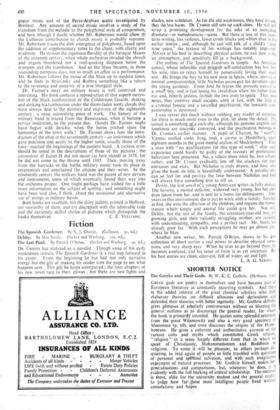F i ct ion The Last Pool. By Patrick O'Brian. (Secker and Warburg.
95. 6d.) DR. CRONIN has matured as a novelist. Though some of his early weaknesses remain, The Spanish Gardener is a real step forward in his career. From the beginning he has had not only narrative energy but the gift of making his reader turn the page to see what happens next. This gift he keeps unimpaired ; the later chapters of h s new novel race to their djmax ; but there are new lights and shades, new subtleties. As for the old weaknesses, they have shrunk, they do less harm. Dr. Cronin still sets up cock-shies. He will still scrap a promising development for the sake of an immediate dramatic—or melodramatic—scene. But there is less of this short- term writing, less violence, fewer crude blacks and whites than in the earlier stories • and, although he can still talk of a child's " brief nine years," the texture of his writings has notably improved Always at his best in describing physical action, he can now evoke an atmosphere, and sensitively fill in a background.
The outline of The Spanish Gardener is simple. An American consul, whose inflexible and priggish self-satisfaction has lost him his wife, tries to repay himself by possessively loving their small son. He brings the boy to his new post in Spain, where, starved of normal companionship, little Nicholas pours out his devotion upon the young gardener. From Jose he learns the pursuits natural to a small boy, and is fast losing his invalidism when his father finds out and, bitterly jealous, forbids the two even to speak They pass notes, they contrive small escapes, until at last, with the help Of a criminal lunatic and a so-called psychiatrist, the innocent com- panionship is destroyed.
I can reveal this much without robbing any reader of suspense, for ,there is much more even in the plot, let alone the detail. The consul is something La cock-shy, although his genuine anguish and loneliness are sincerely conveyed, and the psychiatrist belongs to Dr. Cronin's earlier manner. A pupil of Charcot, he " went'to Vienna, studied under Jung, took a course at Heidelberg, spent eighteen months in the great mental asylum of Mecklenburg." Even a man with "no qualifications for this type of work " .after such experience could hardly be guilty of the travetty of professional behaviour here presented. No, a villain there must be, two villains rather, and Dr. Cronin exultantly lets off the crackers for their entrances and exits. But Nicholas is truly drawn, and Jose, who gives the book its title, is beautifully understood. A novelist who can so feel for and portray the love between Nicholas and Jose will always have something true to tell us. Debby, the first novel of-a young American writer, is fully mature The heroine, a mental deficient, widowed very young, has her chil- dren taken from her, and is sent to a home for delinquents. After years in this environment she is put to work with a family. Terrified at first. she wins the affection of the children, and regains the human stature which • simple and animal life could give her. Not only Debby, but the rest of the family, the seventeen-year-old boy, the growing girls, and their valiantly struggling mother, are revealed with understanding, sympathy, and a perfect tact. Mr. Steele has already gone far. With such perceptions he may go almost any- where he likes. Another new writer, Mr. Patrick O'Brian, shows in his Arst collection of short stories a real power to describe physical sensa- tions, and very sharp eyes When he tries to go beyond these, he becomes confused, and his sense of form is as yet uncertain. But his best stories are clean, clear-cut, full of water, air and light.
L. A. G. STRONG.


















































 Previous page
Previous page